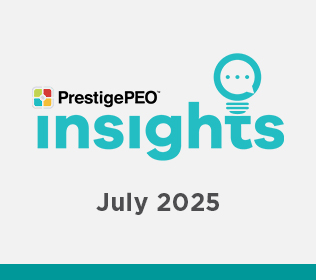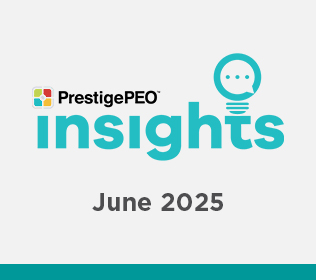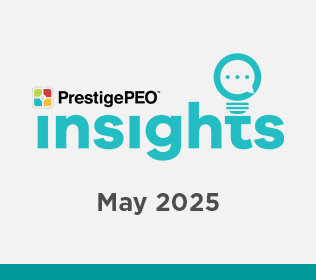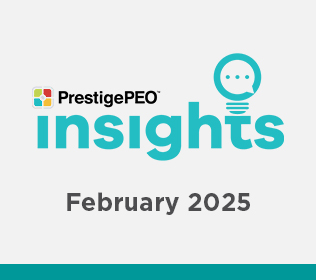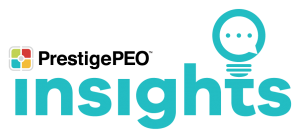
The latest news relevant to you and your business
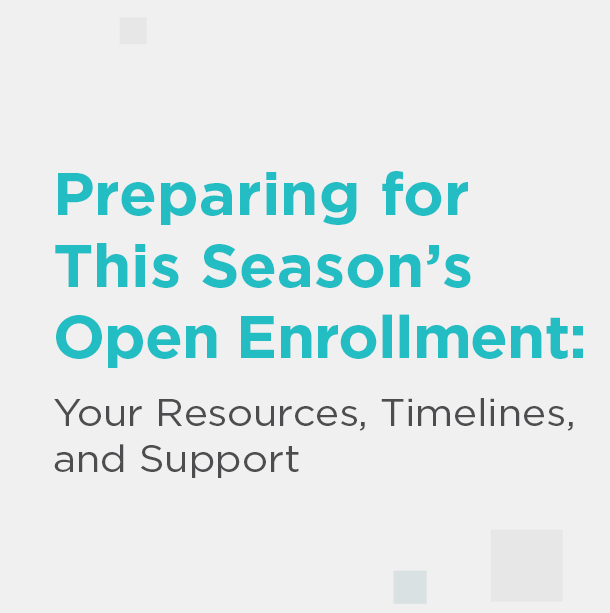

Your Open Enrollment Starts Here
Open Enrollment is just around the corner, and we’re here to make the process as smooth and stress-free as possible for you and your employees. Whether you’re finalizing renewals, preparing to share benefit options, or supporting employee questions, PrestigePEO is with you every step of the way.
Start by exploring our Open Enrollment Resource Center, where you’ll find:
- Renewal Portal User Guides with step-by-step instructions for reviewing rates, modeling contributions, and finalizing elections.
- How-To Videos that walk you through the process from start to finish.
- Plan Updates & Resources to help you understand changes and communicate effectively with your employees.
Mark Your Calendar:
- Now through Sept. 24: Review your renewal details in the Prestige Renewal Portal.
- Oct. 2 – Oct. 24: You’ll receive notification of your group’s specific two-week window during which employees can enroll or change their benefits.
- Throughout OE: Leverage our guides, videos, and dedicated support team to ensure a smooth process.
We understand that Open Enrollment is critical for your business and your employees. That’s why our team is committed to providing clear guidance, timely updates, and the tools you need to make informed decisions with confidence.
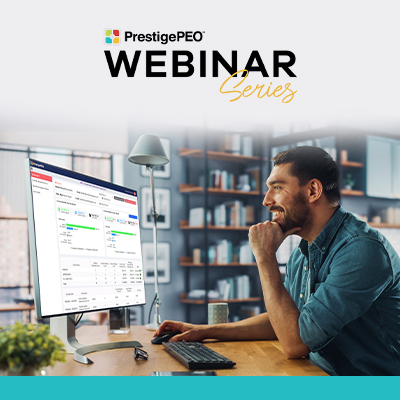
Manage Open Enrollment with Confidence
Join Our August 21st Webinar Session: Your Guide to a Smooth Open Enrollment
Our first “Manage Open Enrollment with Confidence” Renewal Portal training session was a great success, and there’s still time for you to join us for the second session on Thursday, August 21, 2025, at 2:00 PM ET.
This live, step-by-step training will walk you through:
- Tracking employee Open Enrollment progress
- Reviewing benefit classes, costs, and elections
- Understanding what happens if employees don’t complete OE
- Accessing 2025 rates and modeling contribution strategies
- Submitting your renewal decisions with confidence
If you can’t attend live, recordings of both sessions will be available in our Open Enrollment Resource Center so you can review the training at your convenience.
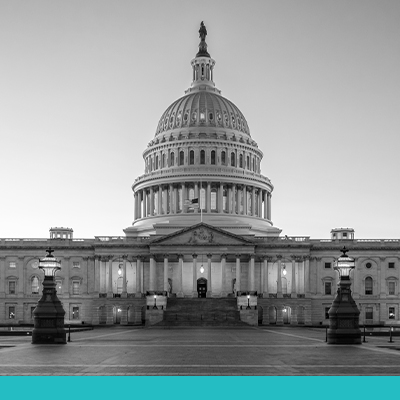
Stay Informed on the One Big Beautiful Bill (OBBB) Act
OBBB: What Employers Need to Know and How to Prepare
The One Big Beautiful Bill (OBBB) Act provides important updates for employers regarding payroll, tax, compliance, and employee benefits.
Our latest blog includes what you need to know and how it may affect your business and workforce.
Then, to enhance your understanding even further, join us tomorrow, Wednesday, August 20, at 2:00 PM ET for an exclusive client webinar. Our compliance team will walk you through the OBBB changes, answer your questions, and share actionable steps to stay compliant.

Discover the Value of BenExtend: Added Protection for Your Employees
Learn How BenExtend Enhances Your Benefits Package
PrestigePEO is excited to partner with Aflac to offer BenExtend, a new voluntary benefit that combines accident, critical illness, and hospital indemnity coverage into one streamlined, employer-paid solution.
This program simplifies your benefits offering while providing employees with meaningful protection at no cost to them.
To learn more, join us on Wednesday, August 27, at 2:00 PM ET for a live session with Thomas Bouvier (Aflac) and Allyson Durand (NFP) to explore BenExtend, employer-paid coverage for hospital stays, ER visits, fractures, cancer, and heart attack.
Don’t miss this opportunity to add more value to your 2025 Open Enrollment season and beyond.
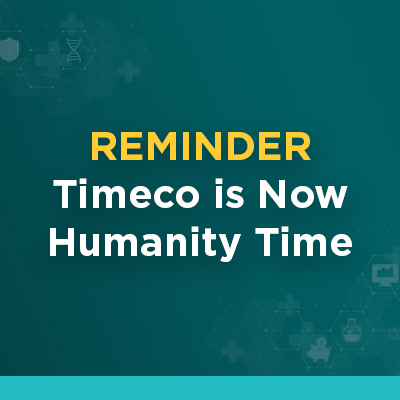
Reminder: Timeco is Now Humanity Time and August 19 Migration
New Name, but Same Trusted Time and Attendance Partner with Better Performance
As part of the rebrand from Timeco to Humanity Time, our platform will undergo a scheduled infrastructure migration today, Tuesday, August 19, 2025, to deliver faster, more reliable performance and improved system stability.
What’s Changing:
- Improved Stability & Speed: Modernized backend for enhanced performance and scalability.
- Minimal Downtime: Brief service interruption expected between 9 PM and 1 AM EST.
- IP Address Updates: If your IT team uses IP whitelisting, please update to the new IPs: 52.86.194.230 and 3.81.240.202.
Most clients do not need to take action; after the migration, you can continue using the platform as usual.
If you have questions, please get in touch with your dedicated PrestigePEO HRBP.
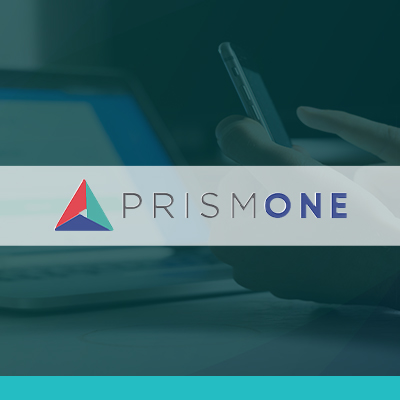
Reminder: One Secure Login for PrestigePRO
Register for PrismONE by November 1
As of August 1, 2025, you should’ve started seeing prompts to register for PrismONE ID, a new, secure single sign-on that will replace your current PrestigePRO login.
Why This Matters:
- Improves security and streamlines access to all PrestigePRO tools.
- One login is required for both the HR platform and the Employee Portal.
Deadline:
- All users must register by November 1, 2025, to continue accessing PrestigePRO.
What to Do:
- Register as soon as prompted, starting August 1.
- Remind your employees and managers to do the same.
Your PrestigePEO team is here to support you. If you have any questions or need further assistance, please contact your HR Business Partner.

IN CASE YOU MISSED IT!
Navigating Paid Leave in CA, MA, NJ, and Beyond
Paid Leave Compliance Strategies for Multistate Employers
Paid leave requirements are evolving fast and are not always in sync. In case you missed it, our recent webinar, Navigating Paid Leave in CA, MA, NJ & Beyond, delivered expert insights from Megan Krouse, Esq., and Neil Fishner on how employers can navigate overlapping (and conflicting) leave laws.
From FMLA to state-specific mandates, we explored key provisions, best practices, and real-world examples to help multistate employers stay compliant while supporting their workforce. Whether you manage one team or several, this on-demand webinar offers clarity and actionable strategies for HR professionals, brokers, and business leaders.

IN CASE YOU MISSED IT!
Multi-State Paid Leave: What’s Active & What’s Coming in 2025
Key Takeaways & What’s Next for Multi-State Paid Leave
If you missed our final Paid Leave Law series session, here’s your chance to catch up. Megan Siegel, Corporate Counsel/HR Consultant, and Adam Burtt, Compliance Benefits Attorney, covered the latest state-mandated paid leave programs and upcoming requirements for multi-state employers.
We broke down what’s active now for states like CT, RI, WA, CO, OR, and DC and what’s launching soon for DE, ME, MD, and MN, so you can prepare, stay compliant, and minimize risk.
Access the recording below and get the insights you need to keep your policies up to date.

Key Compliance Updates for Your Business
DOL Reinstates Voluntary Audit Program for Wage and Leave Errors
The U.S. Department of Labor has resumed its Payroll Audit Independent Determination (PAID) program as of July 2025. This program allows employers to voluntarily correct potential wage and hour or family and medical leave errors under federal law before the government or an employee takes legal action.
Initially launched in 2018 and discontinued in 2021, the PAID program is now available again with updated rules. Employers can now use it to address issues not only under the Fair Labor Standards Act (FLSA), such as unpaid overtime or minimum wage violations, but also under the Family and Medical Leave Act (FMLA), like failures to restore employees after leave or provide proper notice.
This program is specifically designed for employers who have already identified a mistake, such as an error in employee classification or a failure to pay overtime. If a company becomes aware of such an issue and is not already under investigation or litigation, it can apply to the DOL to join the PAID program.
PAID allows eligible employers to self-report errors such as unpaid overtime or missed FMLA job reinstatement and correct them by paying back wages under DOL supervision and taking any additional necessary steps. Payments must be made within 15 days of receiving a wage summary from the DOL, and supporting documentation must be provided to show the issue has been resolved. Employees can choose to sign a DOL-provided release form, although the program does not protect employers from state law claims.
Not every employer qualifies. The company must not currently be involved in a lawsuit, investigation, or have been found to violate the FLSA or FMLA, nor have participated in the PAID program within the past three years. The program also does not apply to employees covered by certain federal contract wage laws or visa programs.
The program is intended for employers who have identified a specific, correctable mistake and want to address it under federal oversight. Participation requires revealing potential violations to the government, and employers should take careful steps before beginning the process. This includes consulting with experienced advisors and legal counsel to determine if the PAID program is appropriate and whether any risks could arise under state law.
PrestigePEO is here to help. For guidance on this or any other questions, please contact your HRBP for help.
Florida Supreme Court Resolves Conflict Regarding Filing Requirements Under the FCRA
In July, the Florida Supreme Court issued its ruling in Steak N Shake, Inc. v. Ramos, resolving conflicting opinions issued by two different appellate court rulings as to the necessity of delineating specific reference to the Florida Civil Rights Act (“FCRA”) as a condition precedent for bringing a discrimination lawsuit.
The FCRA sets forth administrative remedies that must be met for a claimant to bring an employment-related lawsuit in court. These include that the claimant must first file a complaint with the Florida Commission on Human Relations (“FCHR”) that outlines a short and plain statement of facts, and the specific relief sought by the claimant. Prior courts have held that the claimant must reference the Florida Civil Rights Act in the administrative complaint before a lawsuit based on the FCRA can be pursued in court.
In Steak N Shake, the claimant dual-filed his claim of discrimination with both the Equal Employment Opportunities Commission (“EEOC”) and the Florida Commission on Human Rights but only named federal law violations in his allegations and failed to name the FCRA in his complaint specifically. The Florida Supreme Court’s most recent opinion has clarified that the claimant’s effort was enough to satisfy the FCRA’s administrative requirements, reasoning that the statutory conditions precedent to filing suit emphasize the importance of outlining the factual allegations and the relief sought, rather than citing to the specific statute that has allegedly been violated when bringing civil right claims.
What does this mean for Employers?
The Court’s decision reduces the technical administrative hurdles for employees when establishing discrimination claims under Florida law. Claims of discrimination may be established even if the allegations do not expressly mention the FCRA. Employers should analyze all EEOC charges in detail, because even those that only allege federal law violations may have footing for exposure under Florida FCRA as well.
PrestigePEO is here to help. Please contact your HRBP with any questions.
Maine’s New Workplace Surveillance Law Aimed at Employee Protection
A total of 61 bills passed by the Maine Legislature this year are awaiting signature, as Governor Janet Mills has opted to postpone signature on these bills until the new legislative session starting January 2026. One of the bills that sits on the Governor’s desk is Maine LD 61: An Act to Regulate Employer Surveillance to Protect Workers. This bill is designed to protect workers in the state from intrusive employer surveillance by limiting the use of surveillance tools by employers to monitor their employees.
LD 61 would prohibit employers from electronically monitoring employees without giving prior notice. This includes monitoring through electronic devices and systems but excludes the use of security cameras, GPS, and other safety equipment installed in employer-owned vehicles. The bill applies to both public and private sector workers and employers and features a broad definition of ‘employee’ to include nearly anyone who earns a wage. Other provisions aim to ban audiovisual monitoring in an employee’s personal home, vehicle, and property and prevent employers from requiring employees to install data-collection apps on personal phones or devices.
The notice provisions of LD 61 specify that all employers must inform employees in writing before starting surveillance and that candidates for new jobs must be made aware of any monitoring during the interview process. This requirement also applies to current employees, who must receive written notice once a year that confirms the electronic monitoring procedures. Penalties for violating this law range from $100 to $500 per violation.
Although Governor Mills has not signed the bill yet, there are no signs from the Governor’s office that it will be vetoed. Employers should review and update their surveillance procedures and policies before January 2026 to ensure they comply with the bill’s new restrictions.
PrestigePEO is here to help. For questions regarding these new regulations or other matters, please contact your HRBP for assistance.
NLRB Nominations May Signal Future Policy Shifts
The current administration has nominated two individuals to fill long-standing vacancies on the National Labor Relations Board (NLRB), potentially restoring the Board’s ability to issue decisions and resume normal functions. For employers in a co-employment relationship with a PEO, this development could lead to significant changes in how federal labor law is interpreted and enforced.
The Board has lacked a quorum since May after a Supreme Court decision reduced its active members to just two. As a result, many pending cases have been delayed, and the agency has been unable to issue new decisions, causing employers to be in limbo and creating uncertainty in several key compliance areas. If the new nominees are confirmed, the Board will regain a functioning majority, likely accelerating its activities and indicating a potential shift in direction.
Alongside the Board nominations, a new General Counsel nominee is also progressing through the Senate. This position holds significant power, as the General Counsel determines agency enforcement priorities and manages regional office investigations. A confirmed appointee in this role could influence how labor laws are applied in practice.
While a new majority at the NLRB may lead to changes more favorable to employers, current rulings remain effective and legally binding. Employers should not expect reversals to happen immediately or automatically. Maintaining compliance with existing standards remains crucial, especially as the Board continues to handle a backlog of unresolved cases.
Now is a good time for employers to review internal policies, practices, and communication protocols to ensure they stay compliant with current rules, while also preparing for potential changes in the near future.
PrestigePEO will continue to monitor developments closely. Feel free to reach out with any questions about how these changes might affect your business.
Oregon and Washington Join a Growing List of States to Allow UI Benefits for Striking Employees
Oregon and Washington join a growing list of states that permit striking employees to be entitled to unemployment compensation benefits. This change signifies a drastic shift in policy for both states that traditionally have precluded striking workers from accessing unemployment insurance (UI). These new laws will take effect in 2026 and will be similar to those already in effect in New Jersey and New York.
Oregon’s new law, effective January 1, 2026, will impact both public and private sector employees who are either striking or locked out. UI benefits will be extended for 10 weeks, after a two-week waiting period. The benefits will be required to be paid back if the worker is provided back pay from their employer as a result of a strike resolution.
Washington’s new law, also effective January 1, 2026, will apply to both striking and locked-out workers for up to six weeks following a one-week waiting period, with repayment provisions as well.
Other states have considered similar laws, including Connecticut and California, but the respective governors of those states quashed efforts. There is a similar push at the federal level to disqualify workers on strike from UI benefits. These efforts do not extend to employees locked out or precluded from working by the employers due to a labor dispute involving wages, hours, or other terms of employment. In July, a bill was introduced called the Securing Help for Involuntary Employment Loss and Displacement (SHIELD) Act. The bill’s sponsor was quoted as stating, “If you choose to strike, you don’t get to collect a check from hardworking Americans, plain and simple.”
These new laws could have significant impacts on the workplace. Strikes could last for longer periods, and striking employees may be less likely to resolve a labor dispute or strike once UI benefits are received. Employers could also see an increase to their unemployment compensation benefit tax rates.
PrestigePEO is here to help. For questions regarding these new regulations or other matters, please contact your HRBP for assistance.
Rhode Island’s 2025 Workplace Law Changes: What Employers Need to Know
Rhode Island has enacted several important employment law changes that employers need to prepare for. Some are already in effect, while others will take effect in 2026. Here’s a brief overview to help employers stay compliant.
Menopause Accommodations (Effective June 24, 2025)
Rhode Island is the first state to require workplace accommodations for menopause-related conditions, including symptoms like hot flashes and night sweats. Employers with four or more employees must provide reasonable accommodations upon request unless doing so causes an undue hardship. Employers must also update notices and workplace posters and provide written notice to employees by October 22, 2025.
Ban on Captive Audience Meetings (Effective July 2, 2025)
Employers are now prohibited from disciplining or penalizing employees who refuse to attend meetings where the primary purpose is to express the employer’s views on political or religious topics. Exceptions apply for religious institutions and academic discussions. Violations can lead to lawsuits and penalties.
Minimum Wage Increase (Effective January 1, 2026)
Rhode Island’s minimum wage will rise to $16 per hour in 2026, with a further increase to $17 per hour in 2027.
New Hire Notice Requirements (Effective January 1, 2026)
Employers must provide new hires with a written notice detailing pay, benefits, deductions, employment status, and company contact information. Signed copies must be retained for at least three years. Fines start at $400 for noncompliance.
Human Trafficking Training for Lodging Operators (Effective January 1, 2026)
Hotels and short-term rental operators must provide annual human trafficking prevention training and keep records of completion.
Next Steps
Employers should begin reviewing their policies, update training for managers, and ensure compliance with new notice and recordkeeping requirements before the effective dates.
Prestige PEO is here to help. Please contact your HRBP with any questions.
Texas Expands Use of Medical Marijuana: Implications and Guidance for Employers
Understanding Legal Changes, Workplace Impact, and HR Best Practices
The landscape of medical marijuana use in Texas is undergoing significant change. For nearly a decade, Texas has permitted the use of marijuana for specific medical conditions under strict regulations. Recent legislative updates, however, have expanded the list of qualifying conditions, allowing more people across the state to access medical marijuana. These changes directly affect employers, who now need to address complex issues related to workplace accommodations, drug policies, and employee relations. This article examines these recent updates, their effects on businesses, and suggests strategies to stay compliant while maintaining a supportive work environment.
Evolution of Medical Marijuana Laws in Texas
Texas’s journey into medical marijuana started cautiously when the Compassionate Use Program (CUP) was launched in 2015. At first, it only allowed low-THC cannabis prescriptions for people with intractable epilepsy. Over time, laws have gradually expanded the list of qualifying conditions to include multiple sclerosis, spasticity, autism, terminal cancer, PTSD, and, most recently, a broader range of chronic pain and neurodegenerative diseases.
The cumulative impact of these expansions is a significant increase in the number of Texans authorized to use medical marijuana as part of their treatment plan. With each legislative session, the state’s stance has become more inclusive, indicating a growing attitude toward medical cannabis as a legitimate therapeutic option.
Recent Expansion: What Has Changed?
The most recent amendments to Texas’s medical marijuana law have introduced several key updates:
- Expanded List of Qualifying Conditions: Adding more chronic illnesses and mental health conditions allows more employees to qualify for medical marijuana.
- Rising Awareness and Registration: As more Texans learn about these legal options, the state’s registry of medical marijuana users is expected to expand.
- Greater Availability: Licensed dispensaries have expanded their operations, making it easier for qualifying individuals to access their prescribed cannabis products.
Overall, these changes suggest that employers will likely notice an increase in both requests for accommodations and the use of medical marijuana among their employees.
What Employers Need to Know
With the expansion of medical marijuana use in Texas, employers must strike a careful balance between maintaining a drug-free workplace and complying with disability and accommodation laws.
Drug-Free Workplace Policies
Texas law does not require employers to permit the use or possession of marijuana in the workplace. Employers retain the authority to prohibit the use, possession, or impairment by any controlled substances, including marijuana, on company premises. This means that policies banning marijuana use at work can remain in force, even for employees who are legally permitted to use medical cannabis outside of work hours.
The Interactive Process and Reasonable Accommodations
The Americans with Disabilities Act (ADA) and comparable state laws require employers to engage in an interactive process to determine whether reasonable accommodations are necessary for employees with qualifying disabilities or medical conditions. The expansion of medical marijuana eligibility in Texas means more employees may request accommodations related to their use of cannabis.
Key considerations for employers include:
- Understanding the employee’s medical needs and whether medical marijuana is prescribed as part of their treatment plan.
- Determining if the requested accommodation (such as modified work hours, job restructuring, or remote work) is reasonable and does not constitute an undue hardship on the business.
- Documenting all communications and decisions related to accommodation requests to ensure transparency and legal compliance.
Testing and Detection
Employers who conduct drug testing should be aware that THC, the active ingredient in marijuana, can be detected in the body long after its effects have subsided. This presents unique challenges in distinguishing between legal, off-duty medical use and potential impairment during working hours. Employers must communicate their policies clearly and consistently enforce them.
Disability Discrimination Risks
While Texas law allows medical marijuana use, it does not explicitly require employers to accommodate it. However, failing to participate in an interactive process with employees who disclose a disability and request accommodation could lead to discrimination claims under the ADA or state law. Employers should take all accommodation requests seriously and consult HR or legal counsel when necessary.
Updating Workplace Policies and Procedures
Given the changing legal landscape, employers should take proactive steps to review and revise their employee handbooks, drug-free workplace policies, and accommodation procedures. Key actions include:
- Policy Clarity: Ensure all policies explicitly address marijuana use, including the distinction between recreational and medical use and the company’s expectations regarding both.
- Employee Communication: Regularly communicate policy changes and updates to employees through training sessions, memos, or internal newsletters.
- Management Training: Train supervisors and managers on how to handle accommodation requests, signs of impairment, and the importance of confidentiality and non-discrimination.
- Documentation: Maintain thorough records of all policy changes, accommodation requests, and related communications.
Responding to Accommodation Requests
When an employee approaches HR or management with a request related to medical marijuana use, employers should take the following steps:
- Engage in the Interactive Process: Open a dialogue with the employee to understand their needs and explore potential accommodation.
- Assess Impact: Evaluate whether the accommodation would create undue hardship or pose a safety risk in the workplace.
- Stay Consistent: Apply policies consistently to all employees to avoid claims of favoritism or discrimination.
- Consult with Experts: When in doubt, seek guidance from HR professionals, legal counsel, or specialized services to ensure compliance with the law.
Frequently Asked Questions
Can we still enforce a drug-free workplace?
Yes. Texas law allows employers to maintain drug-free workplace policies, including the prohibition of marijuana use on-site or during work hours, even for those with a legal prescription.
What if we receive a request for accommodation involving medical marijuana?
Employers should treat the request like any other accommodation: engage in the interactive process, assess the request’s reasonableness and the impact on the workplace, and make a well-documented decision.
Do we have to allow employees to be under the influence of marijuana at work?
No. Employers are not required to permit employees to be impaired or under the influence of marijuana during working hours.
What are the risks of denying accommodation?
If an employee’s request is related to a disability, denying it without engaging in the interactive process could result in legal claims. Always document your process and consult with HR before making a decision.
PrestigePEO is here to help!
Given the complexities of medical marijuana in the workplace, clients are encouraged to reach out to their HR Business Partner (HRBP) for guidance. Personalized support ensures that accommodation requests are handled appropriately, policies are compliant, and workplace safety is maintained.
The expansion of medical marijuana use in Texas presents new challenges and opportunities for both employers and employees. By staying informed, updating policies, and engaging in good faith with accommodation requests, employers can foster a respectful and legally compliant work environment. Proactive preparation, clear communication, and expert guidance are the best tools for navigating this evolving legal landscape.
Washington State Employment Law Changes
Effective July 2025, Washington State implemented several employment law changes. This summary highlights the most impactful updates for quick reference.
Key Updates:
- Expanded Wage Equality Protections: HB 1905 broadens anti-discrimination rules to include age, sex, marital status, immigration status, the use of service animals, and more.
- Immigration-Related Protections: SB 5104 prohibits using immigration status to coerce employees regarding wages or labor conditions.
- Fair Chance Act: HB 1747 restricts criminal background checks until after a conditional job offer and requires justification for adverse actions.
- Personnel Records Access: HB 1308 mandates employers provide personnel files and discharge reasons within 21 calendar days of request.
- Job Posting Requirements: SB 5408 requires wage and salary disclosures in job postings. SB 5501 prohibits an employer from requiring proof of a driver’s license for a job unless driving is an essential function of the job or related to a legitimate business reason.
What should Washington Employers do?
- Review your equal employment opportunity (EEO) policies and ensure job descriptions and training materials reflect these expanded categories.
- Train managers and supervisors on appropriate communication boundaries and document all wage-related disputes carefully.
- Update background check procedures and ensure hiring managers understand the timing and documentation requirements.
- Align compensation bands with market data and ensure consistency across platforms (e.g., LinkedIn, internal portals).
- Reassess job requirements and remove unnecessary license mandates to avoid compliance risks.
These changes may require updates to onboarding procedures and job posting templates. Prestige PEO is here to help. Please contact your HRBP with any questions.
Why Open AI Matters for Your Business: A Practical Guide for Employers
Artificial intelligence (AI) is rapidly changing how businesses operate. From customer service to hiring, data analysis, and workflow automation, AI tools are becoming more common across industries. As this technology grows, an important concept is emerging: open AI ecosystems, systems that are more transparent, customizable, and not controlled by a single company.
Employers are starting to hear terms like “open-source,” “open-weight,” or “closed models.” These aren’t just technical details; they directly affect how your business can use AI, how much it costs, and how much control you have over your data.
Here’s what employers need to understand and what steps they can take now.
AI Is Becoming a Standard Business Tool
AI tools are no longer limited to large corporations. Businesses of all sizes now use AI for tasks like writing content, scheduling, summarizing documents, assisting with customer service, or analyzing sales data. The technology is becoming standard, similar to how spreadsheets or email once were.
Employers who learn how AI fits into their operations today will be better prepared as the technology becomes more widespread and expected.
What “Open” AI Means and Why It Matters
An “open” AI model is one where businesses can access how the system works, inspect the data used to train it, and, in some cases, customize it. Open AI tools often allow for more transparency, fewer restrictions, and greater flexibility.
By contrast, “closed” AI tools are tightly controlled by the companies that build them. Users typically cannot see how decisions are made, how data is handled, or how models are trained. These tools often include licensing restrictions and usage limits.
For businesses, open AI tools can mean:
- Greater control over your data and workflows
- More flexibility in how you use or adapt the tools
- Reduced risk of vendor lock-in
- Better transparency in how decisions are made, which is essential in areas like hiring or compliance
Risks of Relying Only on Closed AI Tools
Many closed AI tools are well-designed and widely used, but there are limits. These systems may restrict access to features, limit customization, or make it hard to audit results. For example, if an AI hiring tool makes an error, you may not be able to explain how that decision was made, creating legal or reputational risk.
Closed tools can also carry higher long-term costs due to recurring license fees. Relying on one provider may limit your ability to adapt quickly in changing environments.
What Employers Can Do Now
Even without technical expertise, employers can start making informed AI decisions. Consider the following:
- Ask key questions before adopting any AI tool. Who controls it? Can it be audited or customized?
- Consider open or hybrid AI tools that offer more flexibility and transparency.
- Evaluate AI the same way you evaluate other software; based on cost, reliability, and fit.
- Offer basic AI training to your team so they use tools responsibly and understand their limitations.
- Organize and clean business data. AI tools work best with accurate, up-to-date information.
Looking Ahead
AI will continue to grow in importance across industries. Whether you choose open, closed, or hybrid tools, making informed choices is key. Openness in AI isn’t about ideology; it’s about practical business decisions, risk management, and flexibility.
Employers who understand the differences between AI systems and make smart, strategic choices will be better prepared to operate efficiently and adapt to future shifts in technology, regulation, and customer needs.
Prestige PEO is here to help. Please contact your HRBP with any questions.
Know a company that would thrive with stronger HR support, richer employee benefits, and proven compliance expertise? Introduce them to PrestigePEO; you could earn up to $2,500 for every successful referral.
There’s no limit; refer to as many businesses as you’d like and get rewarded each time. Helping your network grow while boosting your bottom line has never been this easy.
Feedback
Have ideas for our next newsletter? We’d love to hear from you! Whether it’s suggestions, questions about our services, or program inquiries, our team is here to help.
Email us at marketingteam@prestigepeo.com to share your thoughts or learn more. Let’s collaborate and grow together!

